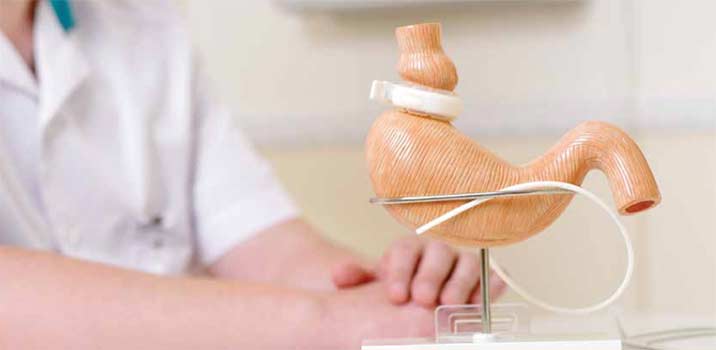When other measures of weight loss are unsuccessful and obesity is causing serious health problems, bariatric surgery offers the most reliable solution. Like every surgery, bariatric surgery has the same risks and there can be complications due to anesthesia, excessive bleeding or infection. Some complications are specific to this surgery and your surgeon will discuss them with you in detail before the procedure.

What Is Bariatric Surgery?
Bariatric surgery is done to treat obesity and is indicated when all the other measures to control weight fail. It is also indicated when there are serious health issues due to obesity like diabetes.
The surgery is done on the stomach and intestines and the stomach is made smaller. This can be done by using a band to constrict it or removing a part of stomach to make it smaller. When the stomach is small it can accommodate lesser quantity of food and people tend to feel fuller soon. They eat less and lose weight quickly. Bariatric surgery also affects the levels of appetite controlling hormones and that can make a person feel less hungry. The incidence of complications is small when the procedure is performed by experts.
In case you wanna know how the surgery is performed, watch a demonstration here:
Possible Complications of Bariatric Surgery
1. Common Surgery Risks
The risks associated with general anesthesia are similar to any other surgery. Besides that, people undergoing bariatric surgery are more prone to having blood clots in the legs after surgery. This is one of the most serious bariatric surgery complications and care must be taken to prevent these blood clots. If they develop, they must be detected and treated immediately to avoid any life threatening complications like heart attack or stroke. There are also chances of wound infection which can be minimized by proper care.
2. Malnutrition
A very commonly experienced complication after undergoing weight loss surgery is malnutrition. When the stomach is very small it can hold less amount of food and this can result in various deficiencies. The best thing is to take vitamin and mineral supplements to keep their levels adequate and to avoid any complications.
3. Inability to Absorb Nutrients
More complex procedures can result in severe protein or vitamin deficiencies. These are mostly seen when a part of intestines is removed along with the stomach. The surgeries most likely to cause severe nutritional deficiencies are Roux-en-Y and the biliopancreatic diversion with duodenal switch.
If not corrected timely, these deficiencies can lead to dementia or heart failure. Taking vitamins and other supplements can reduce the chances of these serious complications.
4. Weak Bones or Osteoporosis
There can be decreased absorption of calcium from the gastrointestinal tract after bariatric surgery. Lack of calcium can lead to weak and brittle bones and sometimes the deficiency is severe enough to cause osteoporosis. The skeleton becomes fragile and there are more chances of fractures.
5. Excessive Sagging Skin
A lot of weight is lost in very short duration after undergoing bariatric surgery. When this happens it leaves a lot of extra skin hanging loose around the tummy or other areas of the body. This skin is not one of the life threatening bariatric surgery complications but it can seem unsightly and can lead to distress. This can be surgically trimmed and removed successfully.
6. Food Intolerance
A very uncomfortable long term complication of bariatric surgery is food intolerance. It becomes very difficult to keep any food down and there can be severe nausea and vomiting. If the condition is severe, hospitalization is recommended to prevent dehydration and malnutrition. There is no way to tell which patient will develop this complication. The treatment is with medicines to control nausea and vomiting and is very effective.
7. Other Complications
Some other bariatric surgery complications are:
- Cardiac problems
- Internal bleeding due to injury to any blood vessels during surgery
- Diarrhea
- Pneumonia and other respiratory problems
- Leakage from the site where the intestine and stomach are joined
- Wound rupture
- Hernia formation at the incision site
- Stricture formation
- Intestinal obstruction
- Formation of ulcers in the newly created stomach pouch
- Injury to the spleen
- Hair loss or thinning
- Emotional stress
Some of these bariatric surgery complications like bleeding, intestinal obstruction, spleen injury or leakage from the junction of stomach and intestines require surgery and urgent correction.
Note: Sometimes the desired weight loss is not achieved even after bariatric surgery.
Can You Reduce the Risks?
The risk of bariatric surgery and the complications associated with it can be reduced by taking the following precautions:
- Quit smoking immediately.
- Try to be as active after the surgery as possible. This will reduce the risk of getting blood clots in your legs. Get out of bed as soon as you can after getting the procedure done and walk as much as you can easily tolerate.
- Start preparing yourself for a different lifestyle long before the surgery. Familiarize yourself with the changes in eating habits. Count the calories, read the labels carefully and pay attention to menu planning.
- Start exercise before getting the surgery. It will help to make your lungs and heart stronger and this will reduce the risks of any complications after the surgery.
- Learn about the gastric bypass diet and discuss with your dietitian or doctor if you have any queries.
- Join a support group and learn from the people who have undergone the procedure or are about to have it. The surgery can be emotionally challenging and listening to other people can help you to understand the process in a better way.
